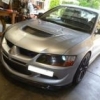I want to try and learn a bit, build my own boost display
Announcements
-
Latest Posts
-
Yes, but no. You need to keep the mating surfaces bare (ie the flat faces where the caliper and upright pads touch the dogbone) and also the internal threads will remain bare (unless there are no internal threads - do they use nuts on all the bolts?). So you can slow down obvious external corrosion, but not all of it. Anodising would be required to provide decent protection to the alloy, but I'm not actually sure if you should anodise something that is all about the strength. Anodising does reduce strength significantly. Like, up to 50% on some alloys for high thickness coating.
-
By drifter17a · Posted
Thanks does painting on aluminium work or stop them from corroding? -
'Sgot nothing to do with them being Japanese. The climate in the north of Japan has similarities to the UK - the cars are made in the knowledge that they have snow and salt, and they rot there. Cars made in the US rot like buggery in the US. British cars have always rotted regardless of the weather. They will rot indoors in a climate controlled bubble! The brackets are not unsafe yet, but they will get that way. They may well corrode where the bolt threads are in contact and the bolts could just jump out without warning.
-
By drifter17a · Posted
So unsafe would you say now? little bit of has come off, guess road salt is a nightmare for Japanese car. Mx5 here have a well known issue or rotting -
Dissimilar metal corrosion. Aluminium is less noble than steel/iron, and will corrode preferentially when in contact with it and a conductive solution (ie, wet road salt). Tends to suggest that those brackets should be made in steel for a shitty climate like the UK.
-


Recommended Posts
Create an account or sign in to comment
You need to be a member in order to leave a comment
Create an account
Sign up for a new account in our community. It's easy!
Register a new accountSign in
Already have an account? Sign in here.
Sign In Now